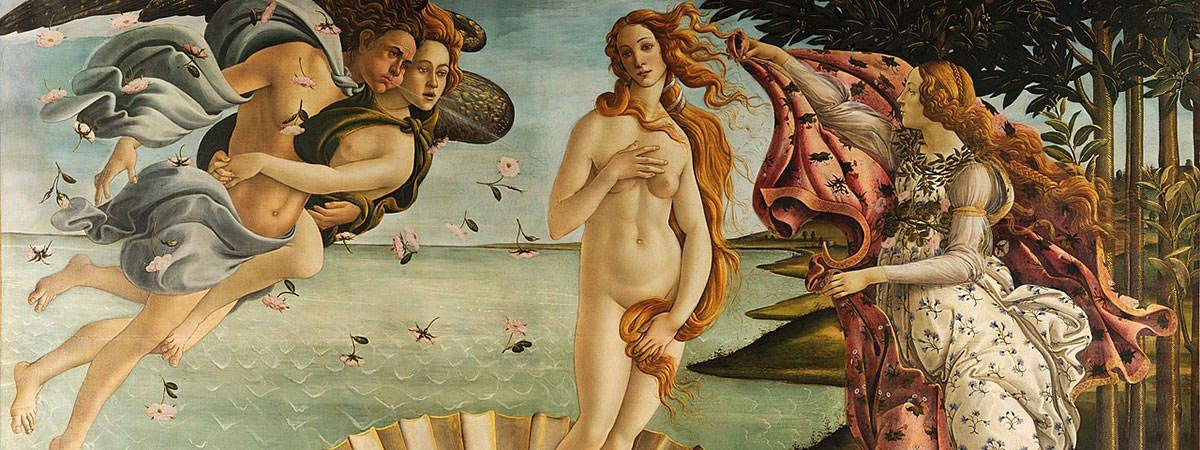Among the most well known Olympians from ancient Greek myths, Aphrodite is the Goddess of love, beauty, passion and procreation. There are few myths regarding her origins, with the most popular one being her emergence from the sea following the castration of Ouronos (Uranus). She is usually said to have been born near her chief center of worship, Paphos, on the island of Cyprus. This is why she is sometimes referred to as Cypris (lady of Cyprus). Aphrodite has the reputation of being an irresistible beauty, which made both men and gods madly lust after her. According to myth there was unrest among the Gods for her favor which ultimately led her to be married to the ugly smithing God Hephaestus. However, Aphrodite was not faithful to her husband and had several affairs with Gods and mortals alike. Aphrodite was later syncretized as the Roman Goddess Venus. She is mostly seen accompanied by the Erotes, winged gods associated with love and sexual desire like Eros (Cupid); Anteros and Himeros. Aphrodite’s major symbols include myrtles, roses, doves, sparrows and swans. Her main festival, the Aphrodisia, was celebrated across ancient Greece, particularly in Athens and Corinth. Know more about the Greek Goddess of beauty and love with the 10 most famous myths featuring Aphrodite.
#1 Origins
Ouronos (Uranus or the Sky) was the primordial deity in Greek Mythology who fathered the Titans and the Giants, with Gaia (Earth). Ouronos felt threatened with the power and fierceness of his Giant sons (the Cyclopes and the Hecatonchires) and thus imprisoned them in Tartarus, the underworld deep inside the Earth (Gaia). This brought great pain and anger to Gaia who in time plotted the downfall of Ouronos with the help of the Titans. According to Hesiod in his Theogony, Gaia went on to create a great stone sickle and persuaded her Titan sons to castrate their father. As the Titans led by Cronus succeeded in castrating their father, Ouronos’ genitals fell in the ocean producing a white foam. From this foam, Aphrodite was born off the coast of Cythera in Cyprus. There are other myths regarding the birth of Aphrodite like in Homer’s Iliad, Aphrodite is referred to as the Daughter of Zeus (leader of the Olympians) and Dione (a nymph or Goddess). Aphrodite is sometimes also described as the daughter of Oceanus and Tethys (both Titans).
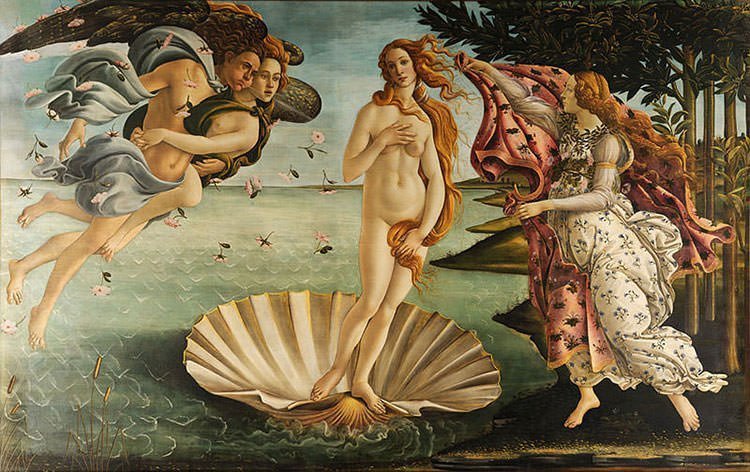
#2 Marriage With Hephaestus
In Greek mythology, Hephaestus was the smithing God of fire and volcanoes who was revered by blacksmiths, sculptors, carpenters, metal workers, artisans and other such craftsmen. However unlike the other Olympians Hephaestus was ugly of appearance and deformed from childhood. But despite his lameness, Hephaestus went on to marry the Goddess of beauty Aphrodite. According to Greek myths, Aphrodite had a long list of suitors which included Poseidon (God of Sea), Hermes (messenger God) and Ares (God of war). This led to several quarrels among the Olympians. In order to bring peace to the heavens, Hera (queen of the Gods) decided that Aphrodite would be married to her son Hephaestus. To Hera, he was the ideal candidate to diffuse the situation, the one who least desired Aphrodite among all other who desired her fervently.
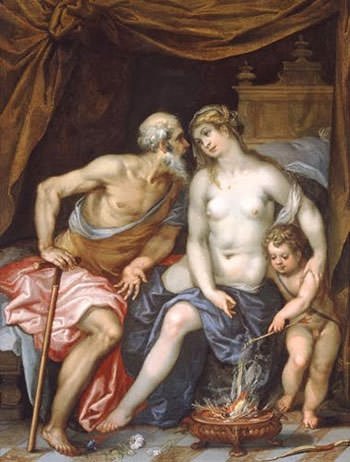
In another noteworthy account, Hephaestus once gifted his mother Hera an exquisite throne. As the Goddess graced the throne she walked into the trap laid for her by Hephaestus, who was extracting his revenge for being rejected at birth by his mother. When Hera was unable to get off the throne the Gods rushed to Hephaestus trying to convince him to let Hera go. Hephaestus finally agreed after his friend Dionysus (God of wine and festivity) got him drunk. However, as the smithing God was about to release Hera, an anxious Zeus appeared and expressed his concern with the situation. Though Hephaestus had decided to let go off his mother, he took advantage of the situation. In return for releasing Hera, he asked his father for the hand of Aphrodite (Goddess of beauty) in marriage. Zeus felt he had no choice and relented.
#3 Judgement of Paris
In Homer’s Iliad, Aphrodite along with Athena and Hera, was one of the three goddesses whose feud resulted in the beginning of the Trojan War. According to the story, Thetis (a Nereid, daughter of the sea God Nereus) and Peleus (mortal son of King Aeacus) were being married on Mount Pelion. All the Gods were invited to this wedding except Eris, the Goddess of discord. An angered Eris decided on revenge and thus threw a Golden Apple among the guests with the words “for the fairest”. The event became a matter of dispute among Aphrodite, Hera and Athena, with each of the Goddesses exercising her claim on the fruit. Zeus was approached but was in no mood to get involved in this rather precarious situation. Instead, he commanded Hermes (messenger God) to lead the three goddesses to the shepherd prince Paris of Troy, who was to decide the issue. When Paris seemed indecisive the Goddesses resorted to bribes, with Hera promising Paris with power over all Asia and Europe and Athena offering him wisdom, fame and glory in battle. However it was Aphrodite who was awarded the apple. She promised Paris with the most beautiful woman on earth as his wife. This woman was Helen, already married to King Menelaus of Sparta. The subsequent abduction of Helen would directly lead to the Trojan War.
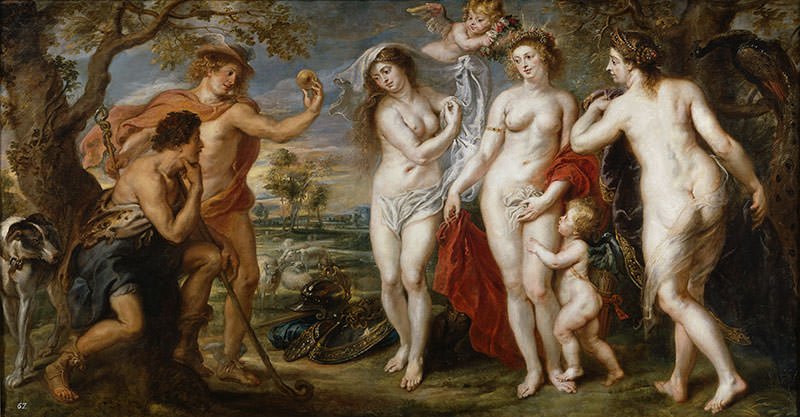
#4 The Cursed Child Priapus
In Greek Mythology, Priapus was a rustic God associated with fertility, and seen as the guardian of crops and livestock. Most stories identify him to be the son of Aphrodite and Dionysus, and a child who was cursed in the womb by Hera. According to the myth shortly after the Trojan war, when Aphrodite was pregnant with Priapus, a jealous Hera found a way to extract her revenge on the Goddess of beauty. Hera had been enraged at being judged inferior to Aphrodite in the judgment of Paris, and placed a curse on Aphrodite’s unborn child. Priapus was thus condemned to be hideous, sexually pervasive and impotent. A curse that denied him the ability to fulfil the very base desires that defined his personality. When Aphrodite gave birth, she was horrified to see that the child had a massive, permanently erect penis, a pot-belly and a huge tongue. She abandoned the infant to die in the wilderness, but Priapus was eventually rescued and raised by a group of shepherds.
#5 Humiliated With Ares
Aphrodite had a number of lovers and affairs while she was married to the smithing God Hephaestus. When Aphrodite was having a secret affair with the Ares (God of war), the couple took advantage of the night when Hephaestus was away working in his workshop. When Ares visited, he was accompanied by attendant named Alectryon, whose duty was to watch the door and warn the lovers of the all seeing Helios, the Sun when it appeared on the horizon. However, once the young Alectryon slept on the job and failed to warn the lovers, and they were seen by the sun God Helios in their act. Full of indignation, Helios sought the God of fire and told him everything. Hephaestus was deeply hurt and decided on his revenge. He designed an intricate net with gold threads, so thin that it was barely visible and yet highly resistant. He then set up his trap on his bed. When Ares visited Aphrodite again and both the lovers were getting intimate, they found themselves trapped in Hephaestus’ net. At this moment Hephaestus appeared along with all the Gods of Olympus and they laughed together at this humiliating moment. Alectryon on the other hand was punished by Ares and turned into a rooster, so that he never forgets to announce the arrival of the sun in the morning.

#6 Hermes And Aphrodite
The messenger God and ‘divine trickster’ Hermes was among the several admirers of Aphrodite. However when the Goddess of beauty rejected his advances, Hermes became greatly depressed and disheartened. Looking at the grim condition of the playful and mischievous Hermes, Zeus pitied him and decided to help. Once when Aphrodite was bathing in the river Achelous, Zeus sent an eagle to lift her sandal and take it to Amythaonia of the Egyptians, and hand it over to Hermes. When Aphrodite finally came seeking for her sandal, Hermes seduced her in exchange for returning the sandal and obtained his desire with her. He then rewarded the eagle by putting it in the sky where it became the constellation Aqtilla.
#7 Seduction of Anchises
According to Homeric hymn to Aphrodite, Zeus was annoyed with Aphrodite for causing the Gods to fall in love with mortals. Hence to treat her with her own medicine, he sent Eros (Cupid) to make her fall in love with a mortal. Anchises was a handsome young shepherd belonging to the royal family of Troy. Once while he was herding his sheep on Mount Ida near the city of Troy, Aphrodite struck by Eros’s arrow fell in love with him. Aphrodite then disguised herself as a mortal and approached Anchises while he was alone in his hut. Looking at her radiant beauty the young prince thought of her as a Goddess or a nymph and desired her blessings. But Aphrodite lied and convinced him of being Phrygian princess, thus seducing him into making love with her. When Aphrodite finally revealed her true form, Anchises was terrified but the Goddess consoled him and promised to bear him a son. Anchises is also warned never to speak about their intimacy or he would face the wrath of Zeus himself. The demigod and Trojan hero Aeneas was born a few months later of their union, who would have a significant role to play in Greco Roman myths following the Trojan War. Anchises on the other hand disregarded Aphrodite’s warning in a drunken state and was crippled by Zeus’s thunderbolt.
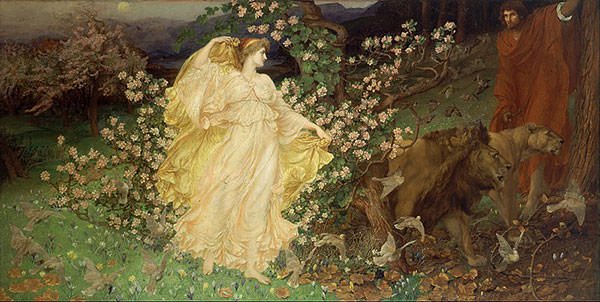
#8 Aphrodite And Hippolytus
In Greek mythology Hippolytus was the son of King Theseus (founding hero of the Athenians) and Hippolyta (daughter of Ares with the Amazon Queen Otrera). Hippolytus grew up to be a sportsman and hunter, who disliked the institution of marriage and was disgusted with the act of sexual intercourse. He thus refused to honor the Goddess of beauty and love Aphrodite, and was instead an ardent worshipper of Artemis, the virgin Goddess of the hunt. The neglect of Hippolytus angered Aphrodite and in an act of vengeance she made his step mother Phaedra (Theseus’s second wife) to fall ardently in love with him. When Hippolytus refused his stepmother’s advances and humiliated her, Phaedra committed suicide leaving a note for her husband which falsely accused Hippolytus of raping her. Upon reading the note, Theseus was enraged at his son but Hippolytus was away on one of his hunting expeditions. Thesues thus called upon Poseidon and used one of the three wishes granted to him by the sea God. Keeping his promise, Poseidon sent a sea monster to terrorize Hippolytus’s chariot horses. As the horses became uncontrollable Hippolytus was thrown off the vehicle and becoming entangled in the reigns. He was soon dragged to his death.
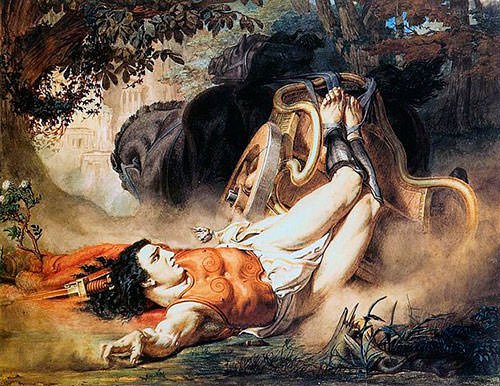
#9 Adonis And Curse of Myrrha
Myrrha was the daughter of King Cinyras of Cyprus and Cenchreis. As Myrrha grew into a beautiful maiden, her mother began bragging of her daughter’s beauty surpassing that of Aphrodite. This offended the Goddess who cursed Myrrha with uncontrollable incestuous feeling towards her father. Trapped in her emotion the young woman tried to take her life, but finally with the help of her nurse, Myrrha tricked Cinyras into an illicit relationship in the darkness of the night. When the king realized the trap he attempted to kill his daughter, but Myrrha escaped and wandered across Arabia offering prayers to the Gods for her redemption. Finally Zeus took pity of on her state and transformed her into a Myrrh bush. As Myrrha had been pregnant with Cinyras’s son when she was transformed, a child was born during the process. This child was Adonis.
The newly born Adonis was discovered by Aphrodite who was taken in by his beauty. She carried the child and handed him to Persephone, to be raised by the Queen of the Underworld. Adonis grew into one of the most handsome mortals in Greek Mythology, and when Aphrodite finally came to take him back, Persephone refused to let him go. Zeus was thus called to resolve the dispute between the Goddesses. The King of the Olympians decided that Adonis would be with Persephone for a third of the year and with Aphrodite for the same period. For the remaining third of the year, Adonis could decide who he stayed with. Adonis would prefer to stay with Aphrodite for his period of the year, however his life would soon be cut short in a hunting accident. Adonis was gored by a wild boar while hunting and died in Aphrodite’s arms. The tears of Aphrodite and blood of Adonis would mix to bring forth the anemone flower. The wild boar according to some myths was none other than Ares who was jealous of the time Aphrodite was spending with the mortal. Other stories identify the Boar as Artemis who was seeking revenge for what Aphrodite had done to her devotee Hippolytus.
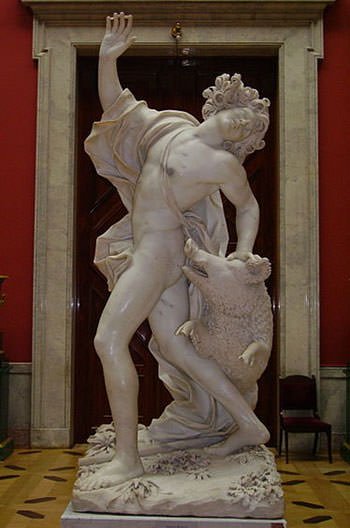
#10 Myth Of Pygmalion
First mentioned by the third-century BC Greek writer Philostephanus of Cyrene and later familiarized in Ovid’s Metamorphoses, the myth of Pygmalion narrates the story of a sculptor par excellence residing in Cyprus. Pygmalion had such devotion for his craft that he had no time for any women in his life, whom he shunned and despised. Once in a moment of inspiration he carved a statue of a woman with unparalleled beauty. The elegant, gentle and divine beauty of his creation made waves of emotions run through him and he could not take his eyes off the figurine. Pygmalion named the statue Galatea, meaning “she who is white like milk”, and adorned it with the finest of clothes and ornaments. He soon fell deeply in love with his creation and on the day of the festival of Aphrodite, prayed with his heart and soul to the Goddess to somehow breathe life into his creation. Touched by his devotion the Goddess of beauty paid a visit to his workshop to witness Galatea. Aphrodite observed the figurine closely, the sculpture almost looked alive and the perfectness of it’s beauty reminded Aphrodite of herself. Finally impressed by Pygmalion’s work and devotion, Aphrodite granted his wish. When the sculptor returned and realized what had happened, he was overjoyed. Soon after he went on to marry his creation and the couple lived happily ever after.
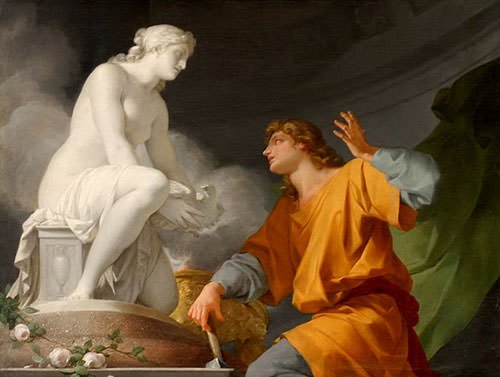
Extra – Hippomenes
In Greek myth, Hippomenes was a young man and one of the disciplines of the wise centaur Chiron. He fell in love with the virgin huntress Atlanta, who strongly disliked the idea of getting married. Atlanta was a notoriously swift runner and to pacify her father kept a rather unusual condition for her marriage. She declared that whomsoever wanted her hand in marriage would have to out run her in a foot race and upon losing be ready to be punished by death. Hippomenes was aware that there was no way he would outpace Atlanta and so he prayed fervently to Aphrodite. Aphrodite finally appeared and gave Hippomenes 3 golden apples and instructed him to drop them one by one to distract Atlanta during the race. It took all the three apples and all of his speed, but Hippomenes was finally successful in winning the race and Atalanta’s hand.

